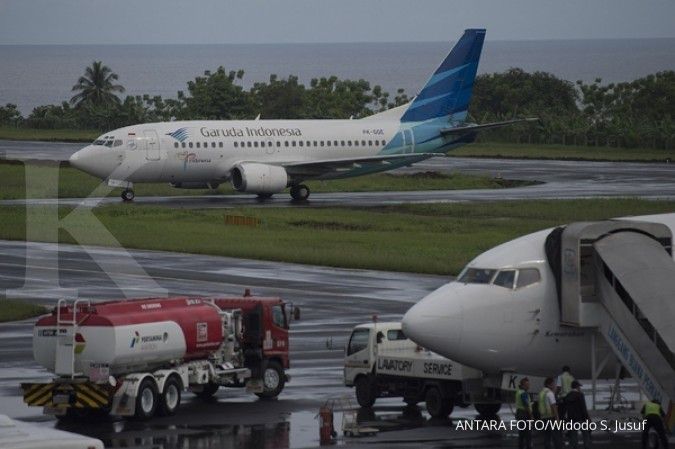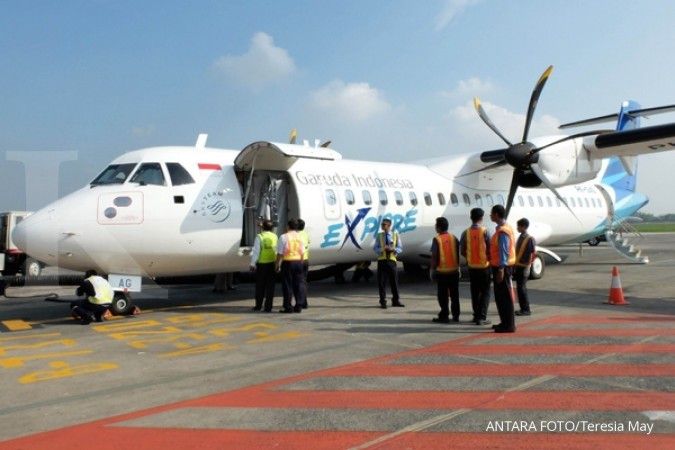JAKARTA. In a bid to reduce operational costs, national flag carrier Garuda Indonesia plans to decrease its overseas flight frequencies and lower the number of its business-class seats.
The move is also aimed at improving the airline’s competitiveness amid turbulent times in the industry.
Garuda Indonesia president director Arif Wibowo said among the flight frequencies that would be reduced were its Jakarta-Haneda, Denpasar-Haneda, Jakarta-Tokyo, Denpasar-Tokyo and Denpasar-Brisbane routes.
“We will reduce the frequencies of our Jakarta-Tokyo and Denpasr-Tokyo routes from two times a day to just one,” Arif said in a press conference on Monday.
“We are also canceling our plan to open a new route to Nagoya, Japan next year,” he continued.
Instead, he said the airline would further expand its network in China to cater to increasing demand from inbound leisure travelers.
“We plan to open a new route connecting Denpasar and Beijing starting on Jan. 12, following the good load factor recorded on our existing route to Beijing,” Arif said, citing that the load factor for its Jakarta-Beijing route had reached 80 percent.
“We consider the macroeconomic side of a situation when deciding to restructure routes,” he continued.
He added that the airline would also offer charter flights connecting Denpasar (Bali) and Manado (North Sulawesi) with several cities in China such as Chengdu, Chong Qin, Ningbo, Kunming, Jinan, Harbin, Xian, Shenyang and
Chengzhou.
Apart from China, the airline is also looking to expand its network in the Middle East on account of the rising number of locals traveling to Saudi Arabia to perform umrah (minor haj).
The former CEO of Garuda’s low-cost airline Citilink also said the firm would reduce its business-class seats from 12 to eight.
By reducing the number of its business-class seats, it is believed that the company will be able to absorb a larger market, about 15-20 percent higher, due to its economic-class seat increase.
“By lowering the cost per seat, we have a better chance to compete with other airlines with a larger capacity,” Arif said.
Arif added that the decision was made in accordance with the company’s analysis result, which said its business class load factor stood only between 40 percent and 50 percent.
The business-class seat reduction would be carried out in stages next year, starting with the airline’s narrow body Boeing 737-800 aircraft, Arif said.
Aviation consultant Gerry Soejatman said Garuda’s restructuring plan was deemed as the right decision on the back of rising operational costs caused by the depreciation of the rupiah against the US dollar, as well as the government’s austerity measures that forbid state officials, one of the airline’s main markets, to fly business class.
“Given his background as a CEO of low-cost carrier, I think Arif has made decisions that will help the airline improve its performance with this efficiency policy,” Gerry told The Jakarta Post.
The publicly listed airline recorded up to US$206.4 million in comprehensive losses in the first nine months of 2014, an increase from $32.54 million recorded in the same period last year.
The company’s operating income during the January-September period rose 4 percent to $2.80 billion from $2.69 billion in the first nine months of last year. (Nadya Natahadibrata)
Garuda outlines restructuring plan to cut costs
January 02, 2015, 04.09 PM
/2014/12/29/1363456440p.jpg)
ILUSTRASI. Kolesterol jahat dalam tubuh bisa dirontokkan dengan mengonsumsi sejumlah vitamin.
Source: The Jakarta Post
| Editor: Hendra Gunawan
Latest News
-
February 07, 2026, 05.13 PM
Indonesia-Australia Relations: Booming Business, Golden Opportunities for Investors
-
February 07, 2026, 04.59 PM
Indonesian Comedian Summoned by Police Over Netflix Show
-
February 07, 2026, 05.57 AM
GLOBAL MARKETS-Stocks, Bitcoin Rally, Regaining Some Lost Ground with Precious Metals
-
February 06, 2026, 07.58 AM
Indonesian Markets Face More Pressure after Moody's Cuts Outlook
-
February 05, 2026, 07.19 PM
Moody's Cuts Indonesia's Sovereign Rating Outlook to Negative
-
February 05, 2026, 02.43 PM
Indonesia Posts Fastest Economic Growth Rate in Three Years
-
February 04, 2026, 04.38 PM
Indonesia's Tax Revenues Jump in January, Finance Minister Says
-
February 04, 2026, 03.34 PM
AUD 1.6 Trillion Australian Pension Funds Ready to Pour into Indonesia
-
February 04, 2026, 02.13 PM
Indonesian Miners Halt Spot Coal Exports Over Proposal to Cut Output












